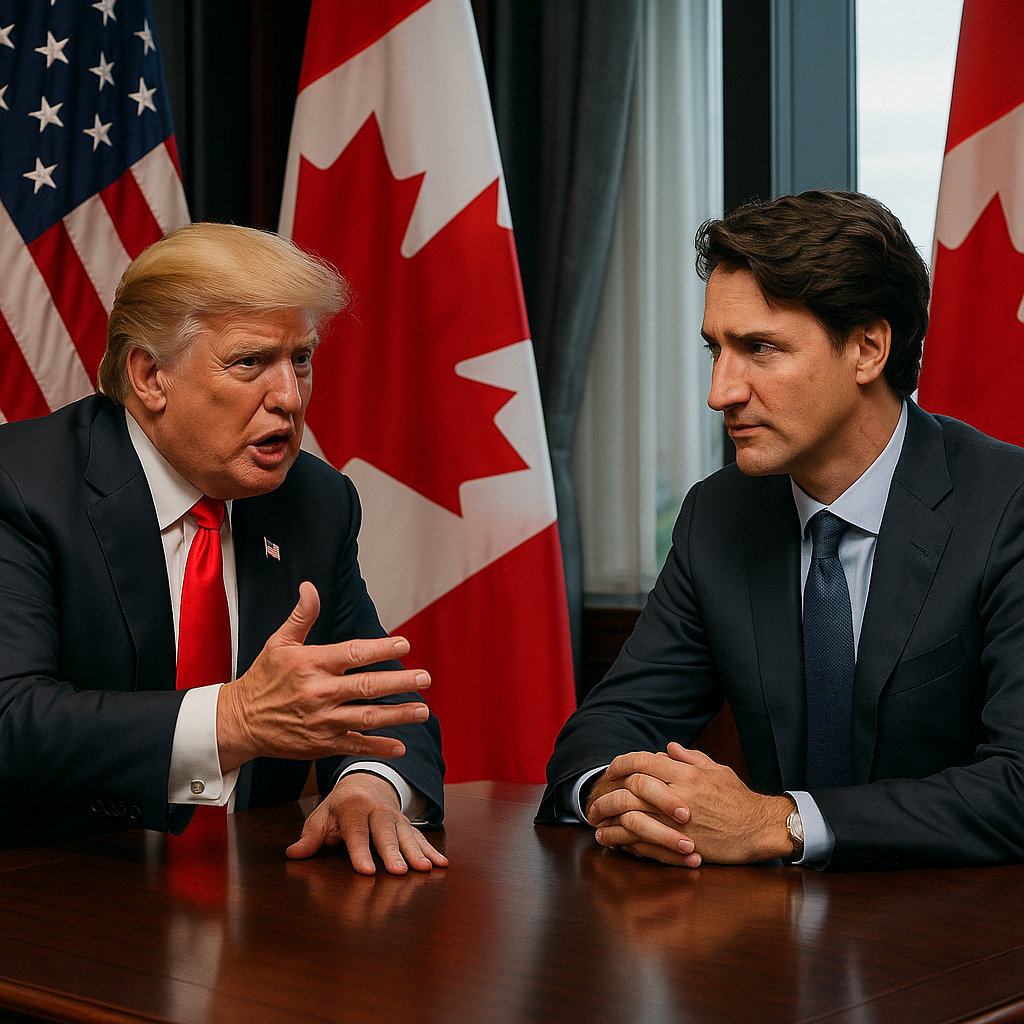Today, Canadians head to the polls to elect a new Prime Minister.
The choice? Liberal leader Mark Carney or Conservative leader Pierre Poilievre.
As voters consider who can best lead Canada into an uncertain future, an unexpected voice weighed in: U.S. President Donald J. Trump.
Writing on Truth Social, Trump posted:
“Good luck to the Great people of Canada. Elect the man who has the strength and wisdom to cut your taxes in half, increase your military power, for free, to the highest level in the World, have your Car, Steel, Aluminum, Lumber, Energy, and all other businesses, QUADRUPLE in size, WITH ZERO TARIFFS OR TAXES, if Canada becomes the cherished 51st State of the United States of America.
No more artificially drawn line from many years ago. Look how beautiful this land mass would be. Free access with NO BORDER. ALL POSITIVES WITH NO NEGATIVES. IT WAS MEANT TO BE!
America can no longer subsidize Canada with the Hundreds of Billions of Dollars a year that we have been spending in the past. It makes no sense unless Canada is a State!”
(Source)
I am Canadian — but I was born in Washington, D.C.
When I first told my son about Trump’s earlier remarks suggesting Canada become the 51st state, he smiled. A part of him liked the idea:
The movies we watch, the headlines we read — they’re mostly American.
Canadians often joke that we are “the boring upstairs neighbor” to the world’s most powerful nation.
But beneath the smile is a real question: What would Canadians gain — and what would we lose — if we became the 51st state?

Canada vs USA: A Quick Contrast
Population:
- United States: ~335 million people
- Canada: ~40 million people.
Military Power:
- The United States spends more on its military than the next ten countries combined.
- Canada’s military budget is modest by comparison (around 1.4% of GDP), though growing under NATO commitments.
Immigration:
- The U.S. historically expects immigrants to assimilate — to adopt “American” cultural norms.
- Canada encourages integration — immigrants retain cultural identity while participating fully in Canadian society.
As scholar Jeffrey Reitz of the University of Toronto notes:
“In Canada, multiculturalism is a matter of public policy. In the United States, the ‘melting pot’ ideal still dominates.”
Gun Laws:
- The U.S. Constitution guarantees the right to bear arms. Trump famously said in 2018:
“The only thing that stops a bad guy with a gun is a good guy with a gun.”
- Canada has stricter gun laws. Handguns are heavily restricted, and semi-automatic rifles are banned.
Healthcare:
- Canada’s single-payer healthcare system covers everyone, paid through taxes.
- In the U.S., healthcare is private and expensive.
According to a 2022 study by The Commonwealth Fund, the U.S. has the highest healthcare costs among developed nations but poorer outcomes than Canada in many categories.
The risk of medical bankruptcy in the U.S. is real.
In Canada, it’s virtually unheard of.
What Would Canada Gain — or Lose — As the 51st State?
Possible Gains:
- Access to America’s vast economic market without barriers.
- Boosted military protection and funding.
- More influence globally, as part of the world’s largest superpower.
Possible Losses:
- Loss of independent governance.
- Threats to Canadian values: universal healthcare, gun control, cultural identity.
- Being subject to American electoral swings — and political instability.
- Canada as it is – will never exist again.
As Canadian historian Michael Adams once said:
“Canadians value their distinctiveness. We are a post-modern society. Americans are still caught in the modern battles.”
This week marks 100 days of Trump’s presidency and opinion polls are scrutinizing his Trump 2.0 https://3narratives.com/100-days-of-trump/
Final Thoughts
At 3Narratives, we ask you to look at both sides:
Narrative One:
- Trump’s vision might seem like an economic and military dream — a future where Canadian industries boom and borders disappear.
Narrative Two:
- Canada’s quiet but sturdy values — community healthcare, multiculturalism, stricter gun laws — could be lost in the noise of a much larger, more polarized political landscape.
It’s easy to admire America’s size and energy.
It’s also easy to underestimate how precious Canada’s quieter strengths really are.
Today, as we vote, the question isn’t just who leads us next.
It’s what kind of country we want to remain.



[…] his victory speech, Carney emphasized the need to defend Canadian sovereignty and economic interests. He pledged to eliminate the consumer carbon tax, halt the hike in capital […]
I don’t think the title of your article matches the content lol. Just kidding, mainly because I had some doubts after reading the article.
Thanks for sharing. I read many of your blog posts, cool, your blog is very good.
Can you be more specific about the content of your article? After reading it, I still have some doubts. Hope you can help me.
Can you be more specific about the content of your article? After reading it, I still have some doubts. Hope you can help me.
Your article helped me a lot, is there any more related content? Thanks!
Your point of view caught my eye and was very interesting. Thanks. I have a question for you.
umsuka
I don’t think the title of your article matches the content lol. Just kidding, mainly because I had some doubts after reading the article.
[…] of Windsor are being polished for an extraordinary guest. King Charles has extended a rare second state invitation to Donald Trump — a gesture unprecedented in modern British […]
[…] public life to villains and heroes. A figure speaks, a corporation reacts, a politician weighs in — suddenly the nation feels compelled to choose a side. These storms are only the latest chapters in a long saga of cultural […]